- HOME
- About Nippon Roll
- A Legacy of 130 Years
Pre-war to
Post-war Era
The aerial photograph shows the wooden factory that was completed one year before it was destroyed by a typhoon in 1937. By 1945, the fifth factory was completed. Only the central part of the third factory was made of steel to prevent fire spread.
1888〜1943
-
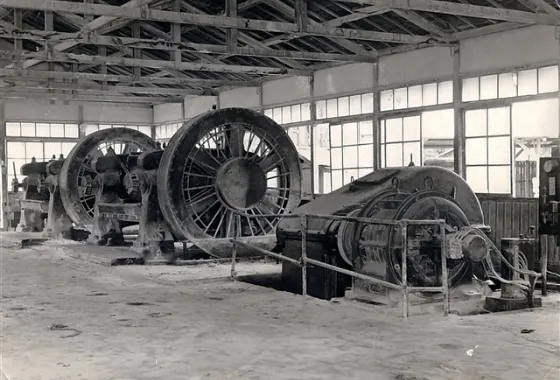 Pre-war Tandem Mixing Roll
Pre-war Tandem Mixing Roll1888
Established Aoki Iron Works in Honjo Matsuzaka Town.
-
1918
Moved to Honjo Kinshicho with business expansion, starting manufacturing of roll machinery.
-
1920
Changed from personal management to a partnership company.
-
1923
Moved to Oshima Town 3-28, Koto Ward, with business expansion.
-
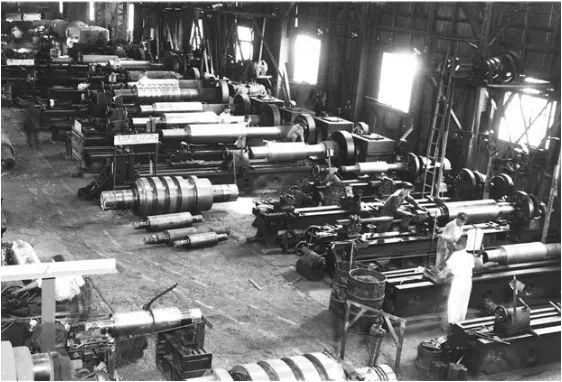 Roll Machining Scene Before the War
Roll Machining Scene Before the War1933 April
Changed to a joint-stock company, named Aoki Roll Manufacturing Plant, with a paid-in capital of 500,000 yen.
-
1939 October
Edogawa Factory completed at 3000 Kasai 2, Edogawa Ward, Tokyo.
-
1940 February
Acquired Komatsugawa Steel Works, began manufacturing cast steel.
-
1942 September
Merged and absorbed subsidiary companies, increasing paid-in capital to 4.5 million yen.
-
1943 April
Changed company name to Nihon Roll Manufacturing Co., Ltd.
1950s
One year after reopening the factory post-war, designed and manufactured the first mixer for vinyl. Developed calender rolls for vinyl sheets, successfully utilizing technology previously used for rubber. The late 1950s were the golden age for vinyl sheet machinery.
1947〜1954
-
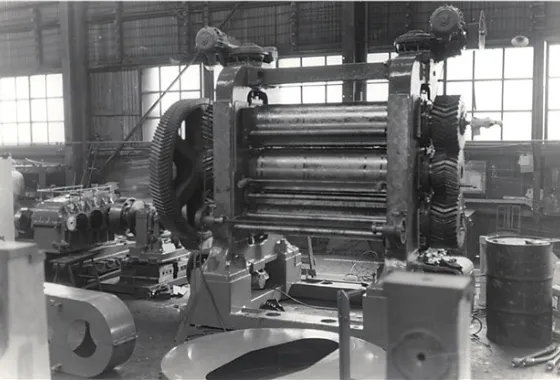 Vertical 3-Roll-Calender of the 1950s
Vertical 3-Roll-Calender of the 1950s1947 September
Resumed production after restoring the war-damaged sections of the Oshima factory.
-
1948 August
Designated as an important industry factory by the Ministry of Commerce.
-
1954 April
Capital increased to 50 million yen.
1960s
A super-large machine assembly factory was completed, said to be the same height as the Marunouchi Building at that time. Began producing large rolling mills, a ⌀40 roll calender, and large presses.
1955〜1973
-
1956 September
Increased capital to 150 million yen.
-
1956 November
Completed the Tokyo Pipe Manufacturing Plant for PVC pipes.
-
1957 November
Designated as a factory for rigid PVC pipes by the Waterworks Association and granted JIS standards.
-
1959 April
Completed a 20t electric furnace and new steel plant, beginning production of large cast steel rolls and cast steel.
-
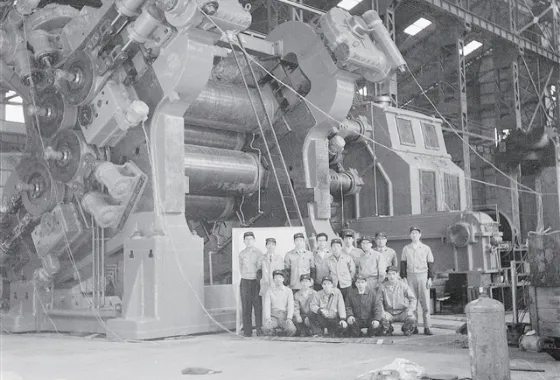 ⌀40S Calender Roll of the 1960s
⌀40S Calender Roll of the 1960s1961 February
Completed a super-large machine assembly factory, began production of large rolling mills and presses. Expanded medium assembly factory in line with busy steel machinery production.
-
1962 July
Expanded the third machine factory for chemical machinery, completed the second turning factory for the roll division.
-
1973 June
Technical collaboration with British Company for special pipe manufacturing.
-
1973 September
Started operation of rolling plant (small steel strip facility, 20,000 tons/month).
1970s to Present
Completed equipment for vinyl testing, following rubber testing facilities. Factories once surrounded by fields became dense with other buildings. Internal factory space also became densely packed.
1974〜
-
1975 March
Obtained JIS standard approval for rebar for reinforced concrete.
-
1985 May
Acquired large hot-grinding machine.
-
1986 September
Capital increased to 498 million yen.
-
1986 October
Completed rubber testing research facility.
-
1987 October
Completed 6-roll calender testing and research facility.
-
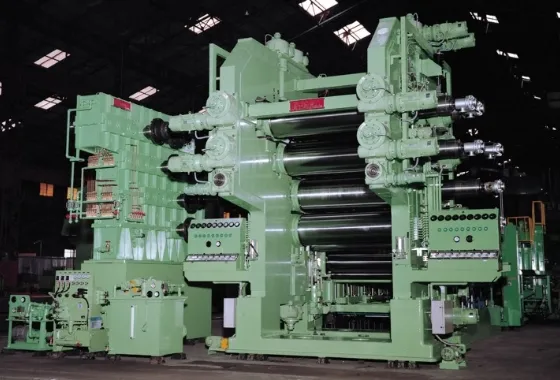 6-Roll Calender
6-Roll Calender1993 February
Obtained patent for "Structure and Usage of 6-Roll Calender" (Patent No. 1735179).
-
1995 September
Yosuke Aoki became President and Representative Director.
-
2008
Celebrated the 120th anniversary.
-
2010 December
Updated 6-roll calender testing and research facility.
-
2011 June
Completed multi-purpose rolling and roll press testing and research facility.
-
2013 August
Established T-Lon Building Materials Business Headquarters.
-
2013 September
Opened Narita Sales Office.
-
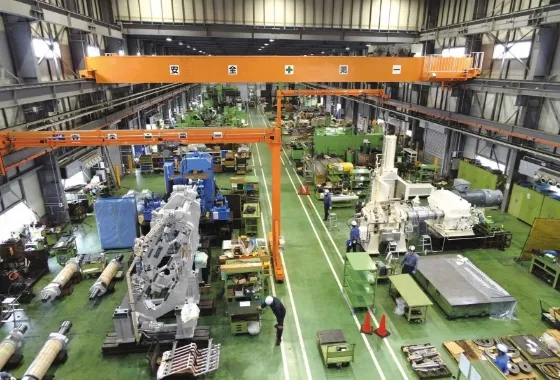 Scenery of Factory Hall C
Scenery of Factory Hall C2016 March
Completed two new factories (B and C) in Higashi Kasai, Edogawa Ward. Started operation of solar power generation equipment (40kW) on C factory building.
-
2016 August
Completed Narita Sales Office in Higashimachi, Narita City.
-
2017 June
Completed new warehouse (D warehouse) in Higashi Kasai, Edogawa Ward.
-
2018 October
Obtained general construction industry license (Tokyo Governor Approval (General-30) No. 149435).
-
2019 September
Obtained specific construction industry license (Tokyo Governor Approval (Special-1) No. 149435).
-
2024 January
Started operation of solar power generation equipment (200kW) on D warehouse building.
